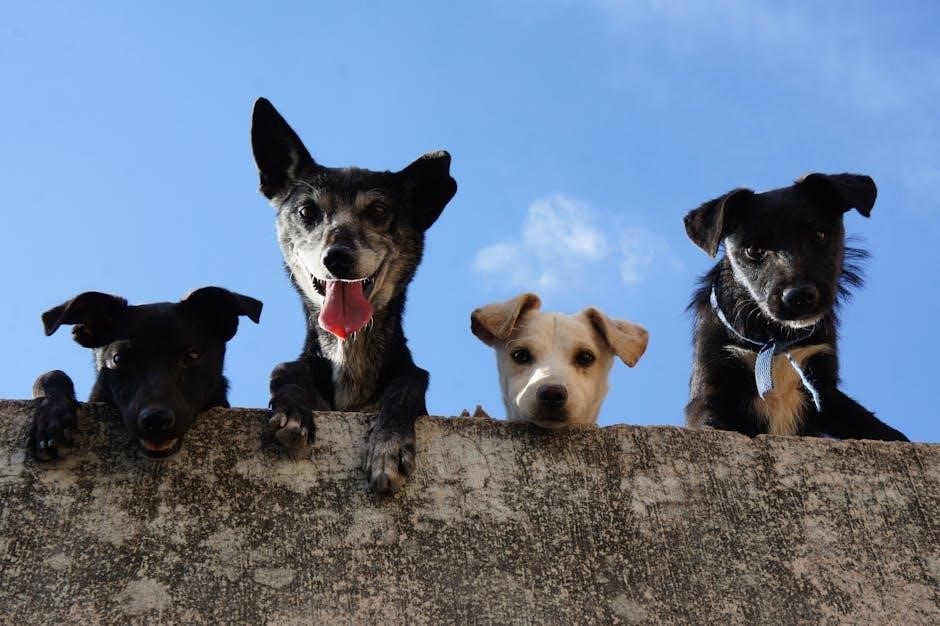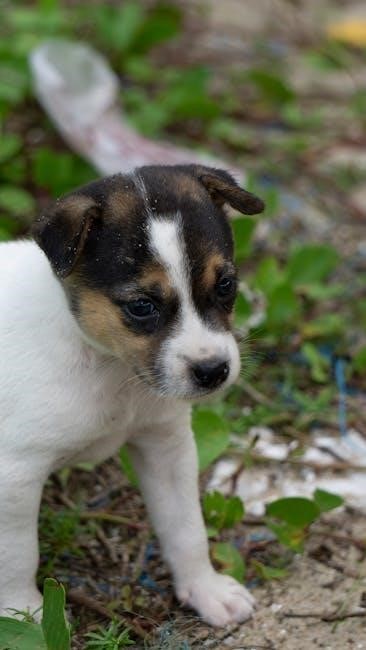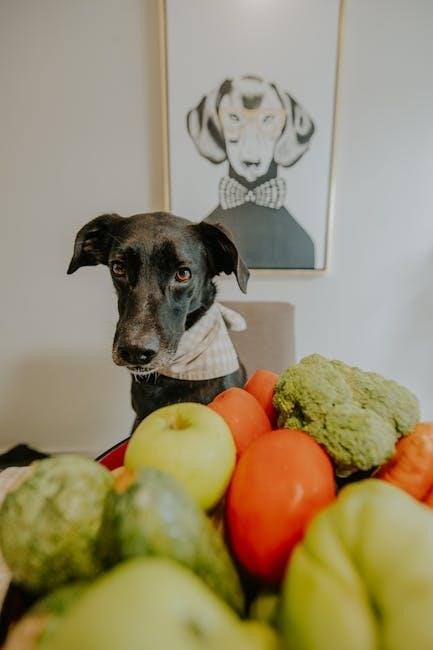
Many common human foods can be toxic to dogs, posing serious health risks. Awareness is key to protecting your pet from accidental poisoning and ensuring their safety.

Why It’s Essential to Know Which Foods Are Toxic
Understanding which foods are toxic to dogs is crucial for pet owners, as even small amounts of certain substances can cause severe health issues or fatalities. Dogs have unique metabolisms, making some human foods dangerous for them. Sharing meals or treats might seem harmless, but it can lead to accidental poisoning. Common household items, including food scraps and trash, often contain toxins. Awareness helps prevent ingestion of harmful substances, ensuring your dog’s safety. Knowledge of toxic foods enables informed decisions about diet and environment, safeguarding your pet from potential threats. Vigilance is key to protecting your dog from everyday dangers hidden in ordinary foods and products.

Common Toxic Foods for Dogs
Certain human foods, such as chocolate, grapes, and onions, are highly toxic to dogs, posing serious health risks. Awareness of these dangers is vital for pet safety.
Chocolate: The Most Recognized Toxic Food
Chocolate is one of the most recognized toxic foods for dogs due to its theobromine content, which can cause vomiting, heart issues, and even seizures in dogs. The darker the chocolate, the higher the theobromine concentration, making it more dangerous. Even small amounts can be harmful, especially to smaller breeds. If a dog ingests chocolate, immediate veterinary attention is crucial to prevent severe health complications. Awareness of this common household toxin is essential for all dog owners to ensure their pets’ safety and well-being.
Grapes, Raisins, and Sultanas: Hidden Dangers in Fruit
Grapes, raisins, and sultanas are highly toxic to dogs, even in small quantities. Consuming these can lead to acute kidney failure, a severe and potentially fatal condition. The exact toxin responsible remains unknown, but their ingestion can cause rapid symptoms such as vomiting, lethargy, and dehydration. Even dried or cooked forms are dangerous, making them a hidden threat in many households. Dog owners must avoid sharing fruit snacks and ensure these items are kept out of reach. Prompt veterinary care is essential if ingestion occurs, as early treatment can improve outcomes. Awareness of this fruit’s dangers is crucial for safeguarding your dog’s health and preventing tragic accidents.
Onions and Garlic: The Risks of the Allium Family

Onions and garlic belong to the Allium family and contain compounds that are toxic to dogs. These foods can damage a dog’s red blood cells, leading to anemia. Both raw and cooked forms are dangerous, as are any dishes containing these ingredients. Even small amounts can cause symptoms like vomiting, diarrhea, and lethargy. Over time, repeated exposure can lead to more severe health issues. Dog owners must avoid feeding their pets any foods containing onions or garlic, as the risks far outweigh any perceived benefits. Keeping these items out of reach is essential for preventing accidental ingestion. Immediate veterinary care is crucial if a dog consumes onions or garlic, as early treatment can significantly improve outcomes.

Less Obvious Toxic Foods
Beyond common culprits like chocolate and grapes, certain foods like caffeine, xylitol, and macadamia nuts are surprisingly toxic to dogs, necessitating vigilant monitoring of their diet.
Caffeine: A Common Household Toxin
Caffeine is a prevalent household substance that poses significant risks to dogs. Found in coffee, tea, energy drinks, and some medications, caffeine can cause hyperactivity, rapid heart rate, and even seizures in dogs. Due to their smaller size and different metabolism, dogs are highly sensitive to caffeine’s effects. Symptoms can develop quickly, often within 1-2 hours of ingestion, and may escalate to life-threatening conditions if left untreated. It is crucial for dog owners to secure caffeine-containing products and be aware of their pets’ access to such items. Immediate veterinary care is essential if accidental ingestion occurs, as prompt treatment can significantly improve outcomes.
Xylitol: The Sugar Substitute That’s Deadly for Dogs
Xylitol, a sugar substitute widely used in sugar-free gums, candies, and baked goods, is highly toxic to dogs. Even small amounts can trigger a rapid drop in blood sugar, leading to seizures, tremors, and even liver failure. Dogs metabolize xylitol differently than humans, causing their bodies to release excessive insulin, which can be fatal if not treated promptly. Common sources include peanut butter, protein bars, and toothpaste. Owners must strictly avoid exposing their pets to these products and recognize early signs of poisoning, such as vomiting or lethargy, to seek immediate veterinary care. Preventing xylitol ingestion is critical, as it remains one of the most dangerous substances for dogs due to its severe and swift effects.
Other Hazardous Substances
Besides toxic foods, other substances like macadamia nuts, avocado pits, and raw dough can harm dogs. These items cause symptoms ranging from digestive issues to severe health complications.
Macadamia Nuts: Why They’re Bad for Dogs
Macadamia nuts are highly toxic to dogs and can cause severe health issues. Even small amounts can lead to symptoms like weakness, depression, vomiting, tremors, and hyperthermia. The exact toxin in macadamia nuts is unknown, but it affects the nervous system and muscles. Symptoms typically appear within 3-12 hours of ingestion and can last up to 48 hours. While not usually fatal, severe cases may require veterinary intervention. It’s crucial for dog owners to keep macadamia nuts out of reach and monitor their pets for signs of illness if exposure occurs. Immediate veterinary care is essential to ensure the best outcome for affected dogs.
Other Foods to Avoid: Avocado Pits, Raw Dough, and More
Avocado pits, while not as toxic as chocolate, can still pose risks to dogs. The pit itself can cause intestinal blockages, and the flesh contains persin, which can lead to vomiting and diarrhea in some cases. Raw dough, particularly yeast-based dough, is dangerous because it ferments in the stomach, producing ethanol and leading to alcohol poisoning. Additionally, certain fish like salmon and trout, if raw or undercooked, can contain parasites harmful to dogs. Bones, especially cooked ones, can splinter and cause internal injuries. Awareness of these lesser-known dangers is crucial for maintaining your dog’s health and preventing costly veterinary emergencies. Always double-check the safety of any food before sharing it with your pet.
What to Do If Your Dog Ingests Toxic Food
Stay calm, contact your vet or pet poison control immediately, and follow their advice. Do not induce vomiting unless instructed. Seek urgent veterinary care promptly.
Immediate Actions to Take
If your dog ingests toxic food, remain calm and act quickly. Contact your veterinarian or a pet poison hotline immediately for professional guidance. Do not attempt to induce vomiting unless explicitly instructed by a veterinary professional, as this can sometimes worsen the situation. Provide detailed information about the ingested substance, including the amount and time of ingestion, to help experts assess the severity. Keep your dog calm and still to prevent further stress. Seek urgent veterinary care without delay, as timely intervention is crucial for preventing serious health complications. Every minute counts in ensuring the best possible outcome for your pet.
Long-Term Monitoring and Veterinary Care
After initial treatment, close monitoring of your dog’s health is essential to ensure full recovery. Schedule follow-up appointments with your veterinarian to assess any potential long-term effects of the toxic exposure. Blood tests, urine analysis, and other diagnostic tools may be used to evaluate organ function and overall health. Your vet may recommend specific treatments or dietary changes to support recovery. It’s crucial to adhere to all veterinary advice and attend scheduled check-ups to monitor progress. Additionally, observe your dog’s behavior and physical condition at home, reporting any unusual signs or symptoms to your vet promptly. Consistent veterinary care ensures the best possible outcome for your pet’s health and well-being.
Awareness of toxic foods is crucial for protecting dogs. Knowing which foods to avoid and acting promptly ensures their safety, fostering a healthy, happy life for your pet.
Keeping Your Dog Safe: A Summary of Key Points
Protecting your dog from toxic foods requires vigilance and knowledge. Always research a food’s safety before sharing it with your pet. Common culprits like chocolate, grapes, and onions must be avoided. Household items such as caffeine and medications are also dangerous. Prevent access to hazardous substances by storing them securely. If ingestion occurs, contact your veterinarian immediately. A quick response can prevent severe health issues. Educating yourself about harmful foods ensures a safe environment for your dog. Regularly reviewing updated lists of toxic foods helps maintain awareness. By taking these steps, you can safeguard your dog’s health and enjoy a long, happy life together.




